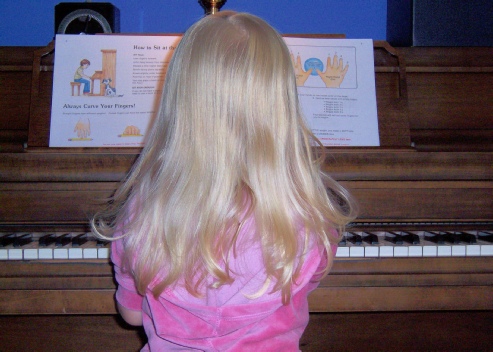Copyright © 2017 wonderding.com USA, Site Map


The Best Age to start Piano Lessons
Factors to consider before signing your child up for piano lessons
By Julie A. Lind
As a professional piano teacher, parents often ask me what age is the best age to begin piano lessons. Since all children have different skills and abilities, the perfect age to begin private piano lessons depends on the individual child. But there are several factors to consider when deciding when to start your child in private piano lessons.
The three main categories to consider when determining if your child is ready for piano lessons are academic skills, emotional maturity, and natural musical abilities.
What many parents don’t understand is how complicated reading music can be. Piano students not only need to know the alphabet forward from A to G, but they also need to know those seven letters in reverse: G, F, E, D, C, B, A. Melodies are made up of the musical alphabet going forward, backward, and even skipping over one or more letters. Just imagine how difficult this task would be for a 5 year old who is just learning their alphabet.
Addition and subtraction are also important skills used in music. Students must memorize the number of beats each type of note gets (example: a quarter note is gets one beat, a dotted half note gets 3 beats). Then your child will need to add up those notes for each measure. If your child cannot do simple math such as 1 + 3 = 4, then they may have difficulty when it comes to counting.
Does your child have a good sense of rhythm? Clap a short rhythmic pattern and see if your child can clap the same rhythm back to you. Ask your child to tap their toe or clap to the music on the radio to see if they are able to hear the beats.
Does your child know their right and left hands? Piano music has notes specifically written for either the right or left hand. If your child is confused about which is which it may slow down their ability to play the notes correctly.
Can your child hear when a melody goes up or down? Try singing Happy Birthday and asking your child to tell you when the notes are going up, down or staying the same.
Most piano teachers will have the child’s assignment written down in an assignment book. If your child cannot read, it will be your responsibility to sit with your child during their daily practice sessions. It is important to make sure your child is following all of the instructions correctly. If you are not willing or able to devote that much time for piano lessons, you should wait until your child is old enough to read the assignment notes and practice on their own.
Emotional maturity is necessary in piano lessons because studying an instrument takes a lot of patience, concentration and repetition. If your child has a short attention span, is unwilling to accept constructive criticism, gets easily frustrated or bored, or is unable to behave during the lesson, then they aren’t ready for private piano lessons.
Some children will have natural musical abilities that become apparent early in their lives. You will find these children will dance and clap when they hear music. They will sing songs using the correct pitches. They will naturally be drawn to instruments and attempt to create music that is pleasing to the ear. Typically these children will have a much easier time learning how to play the piano. These children would probably benefit from starting piano lessons at a younger age of five to six years old.
I personally believe the best age to begin private piano lessons for the typical child is at age seven or eight years old. I have found that most eight-
The Music Teachers National Association (MTNA) website gives this recommendation, “Formal music lessons can begin when students are officially starting formal school, usually first grade.”
Keep in mind some piano teachers believe it’s better to start students when they are younger than age seven. These teachers will often use special methods for teaching younger children. Typically lessons for younger students will involve playing music using finger numbers instead of musical notation, and spending a lot of the lesson time playing musical games and doing floor activities. When choosing a piano teacher, be sure to ask what ages the teacher specializes in.
While I recommend not starting too young, I also don’t recommend putting lessons off for too long. Studies in brain development show the importance of making musical brain connections at a younger age. Researchers have shown that these brain connections need to be made in the formative years between the ages of six and eight. People who didn’t make these connections during these years reportedly lost the ability to form these brain connections later in life. That doesn’t mean they couldn’t play music, music just may not come as naturally as it would have if the student had begun their musical training before age nine.
Even if your child isn’t ready for formal piano lessons, there are other musical opportunities available for your child. Many Community Education programs offer group music appreciation classes. The Music Teachers National Association recommends that 5-

Would you like to comment on this article?